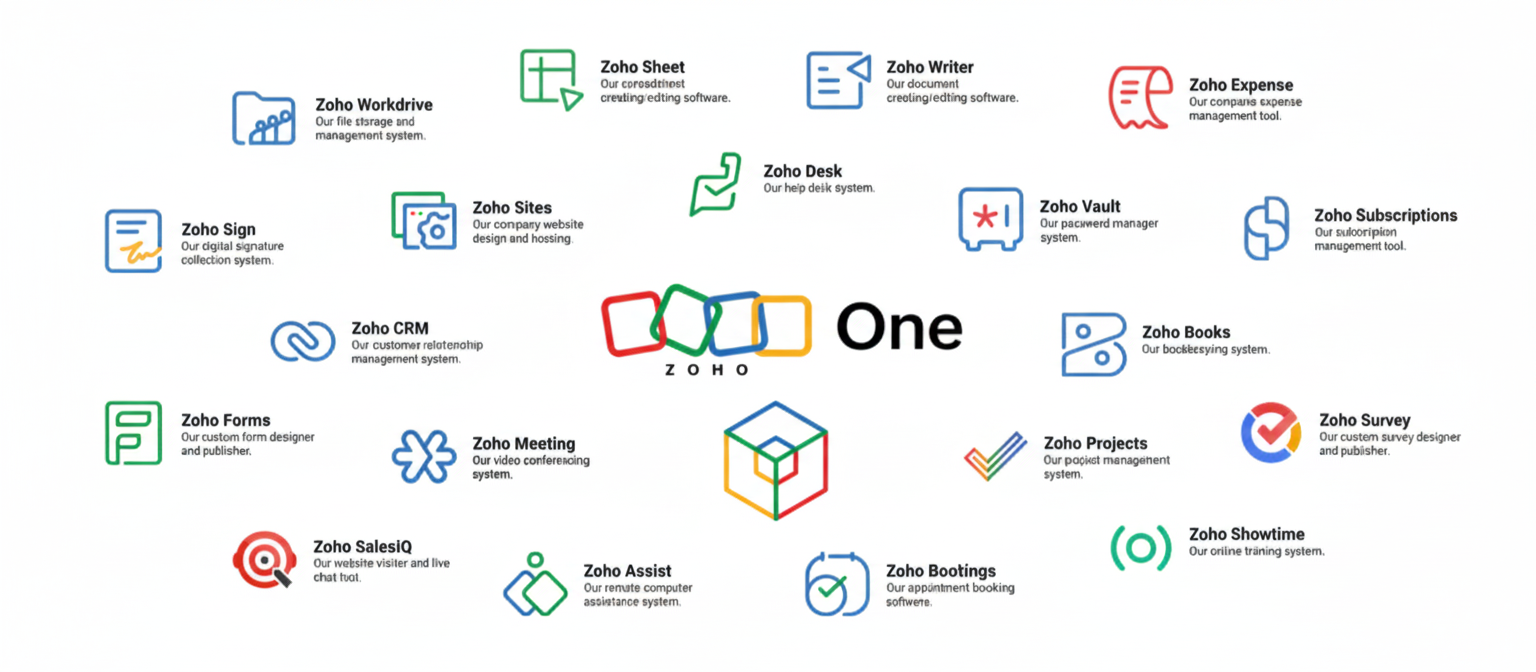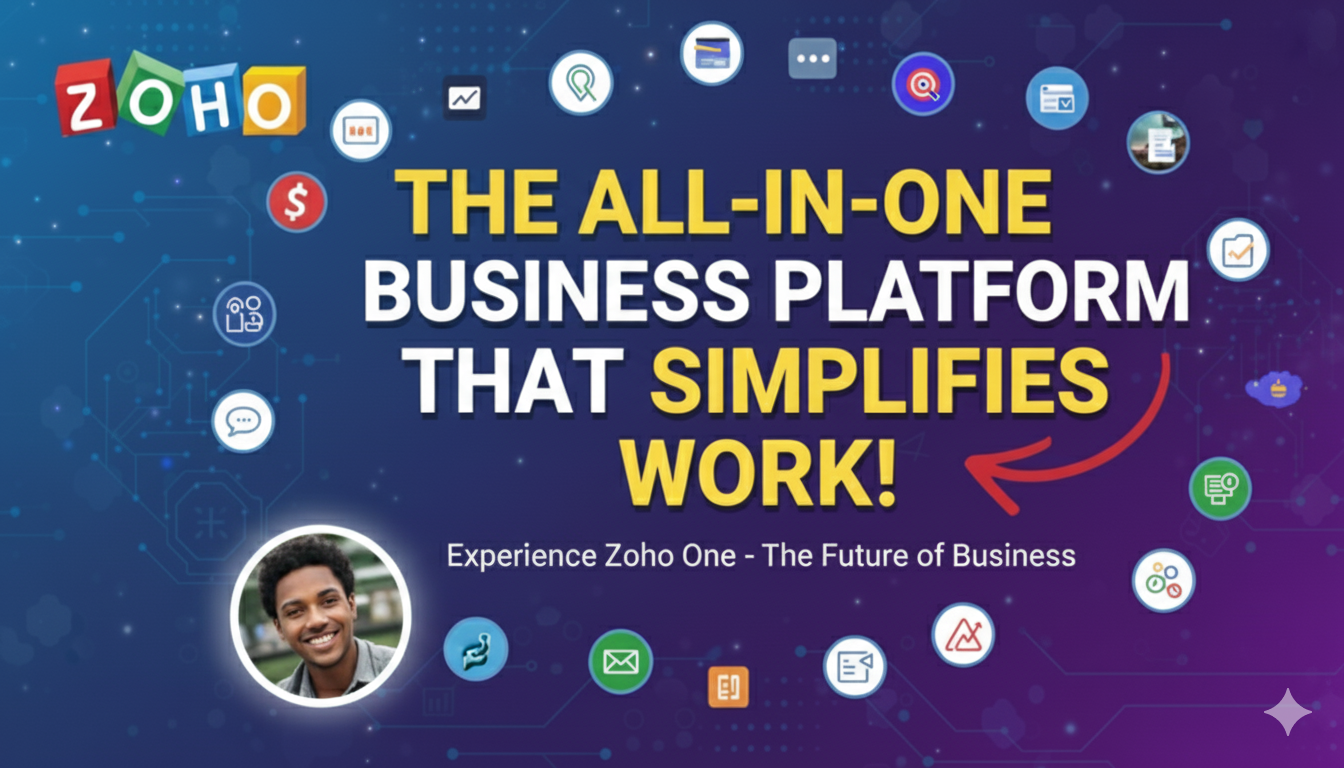Running a business with scattered tools across multiple platforms? Zoho might be the unified solution you need. This comprehensive guide covers everything about Zoho's business suite, pricing, features, and whether it's the right fit for your company in 2025.
What Is Zoho? Understanding the Business Platform
Zoho is a comprehensive business software suite featuring over 50 integrated applications designed to streamline your entire business operation. From customer relationship management (CRM) to accounting, project management, HR, and customer support, Zoho eliminates the need for multiple software vendors by offering a unified ecosystem where data flows seamlessly between applications.
Unlike traditional software stacks that require complex integrations and data transfers, Zoho provides a single source of truth for your business data, reducing duplication and improving operational efficiency.
Who Uses Zoho?
Businesses of all sizes leverage Zoho, including:
- Small businesses seeking affordable, integrated solutions
- Growing startups scaling their operations
- Service-based companies (agencies, consultants, IT providers)
- E-commerce businesses managing inventory and customer relationships
- Privacy-conscious organizations avoiding ad-based platforms
Zoho Apps Breakdown: Essential Tools for Your Business
Sales and Marketing Applications
Zoho CRM serves as the cornerstone of customer relationship management, helping teams manage leads, track sales pipelines, and monitor deal progress. The platform consolidates all customer interactions, enabling stronger relationships and data-driven sales decisions.
Zoho Campaigns integrates directly with Zoho CRM, allowing targeted email marketing based on actual customer behavior and sales data. This integration ensures your marketing efforts align with sales intelligence.
Zoho Social centralizes social media management across multiple platforms, offering post scheduling, engagement monitoring, and performance analytics in one dashboard.
These integrated tools help businesses build cohesive sales and marketing strategies that adapt to market conditions while maintaining customer engagement.
Finance and Accounting Solutions
Zoho Books delivers cloud-based accounting functionality for invoicing, expense tracking, and comprehensive financial reporting. The platform automates repetitive workflows, enhances accuracy, and provides real-time financial visibility.
Zoho Invoice specializes in professional invoicing with customization options, automated payment reminders, and multi-currency support. It's particularly valuable for freelancers and small teams requiring efficient billing processes.
Zoho Inventory handles stock management, warehouse operations, and multi-channel sales coordination. Integration with e-commerce platforms creates a unified view of operations, essential for growing retail and wholesale businesses.
Together, these financial tools streamline operations from billing to reporting, helping businesses maintain financial oversight and optimize resource allocation.
Team Collaboration and Productivity Tools
Zoho Projects combines task management, milestone tracking, time logging, and team collaboration in a single platform. Teams can coordinate work, track progress, and meet deadlines more effectively.
Zoho Workplace offers a complete collaboration suite including professional email, instant messaging (Cliq), document creation, and cloud storage (WorkDrive). It's a viable alternative to Google Workspace or Microsoft 365 for businesses seeking integrated collaboration tools.
Zoho Meeting provides secure video conferencing capabilities for remote teams, ensuring professional and confidential virtual communications.
These productivity applications enhance teamwork and enable effective remote collaboration, critical capabilities in modern business environments.
Customer Support and Service Management
Zoho Desk delivers context-aware helpdesk functionality, enabling support teams to provide personalized customer service by accessing complete customer history across all touchpoints.
Zoho Assist facilitates remote support and troubleshooting, allowing technical teams to resolve issues efficiently without on-site visits.
HR Management and Business Intelligence
Zoho People manages the complete employee lifecycle, including payroll processing, attendance tracking, leave management, and HR workflows. It centralizes people operations for businesses of all sizes.
Zoho Analytics transforms raw business data into actionable insights through customizable dashboards and reports, without requiring dedicated data science resources.
Zoho Creator is a low-code development platform enabling businesses to build custom applications tailored to specific workflows and requirements, extending Zoho's capabilities beyond standard features.
Zoho One Pricing: Complete Cost Breakdown 2025
Rather than purchasing individual applications separately, Zoho One bundles nearly all Zoho applications under a single subscription license.
Current Pricing Structure
- Starting price: Approximately $37 per user per month for the All Apps plan (2025 pricing)
- Billing: Monthly or annual options available
- Included: Access to 50+ Zoho applications
- Value proposition: Replaces multiple software subscriptions, simplifying budgeting and reducing total cost of ownership
For small and medium-sized businesses, Zoho One often provides better value than piecing together individual SaaS subscriptions from multiple vendors.

Individual App Pricing
Zoho also offers individual app subscriptions if you need only specific functionality:
- Zoho CRM: Starting from free tier to enterprise plans
- Zoho Books: Free for small businesses, paid plans for growing companies
- Zoho Projects: Free and premium tiers available
Why Businesses Choose Zoho: Key Advantages
Deep Native Integration
Zoho applications share data naturally without complex API configurations. Leads captured in CRM automatically connect to invoicing in Books, support tickets in Desk reference customer history, and projects link to time tracking across the platform.
Cost-Effective Pricing Model
Especially through Zoho One, businesses access enterprise-grade functionality at small business prices. The unified licensing model eliminates per-app negotiations and reduces software sprawl costs.
Privacy-First Philosophy
Unlike platforms monetizing through advertising, Zoho prioritizes customer data protection. The company maintains a privacy-focused business model that doesn't rely on selling user data.
Scalability and Flexibility
Start with one or two core applications and expand as your business grows. The modular approach allows businesses to add functionality without switching platforms or migrating data.
Human-Centered Design
Zoho focuses on usability and long-term customer value rather than trendy features. The platform emphasizes practical functionality that solves real business problems.
Zoho Limitations: What to Consider
Initial Overwhelm
With over 50 applications available, new users may feel overwhelmed. Starting with core applications that address immediate pain points helps manage the learning curve.
Integration Mastery Takes Time
While integrations are powerful, understanding how to optimize cross-app workflows requires investment in learning and setup.
Support Response Times
Support quality can vary by region and plan tier. Enterprise customers typically receive faster response times than free or basic tier users.
Enterprise Customization Depth
For extremely complex enterprise deployments requiring extensive customization, platforms like Salesforce may offer more advanced configuration options.
Zoho vs Competitors: Detailed Comparison
Zoho vs Salesforce
Salesforce strengths: Highly customizable, extensive third-party ecosystem, enterprise-focused features
Zoho advantages: Significantly more affordable, faster implementation, easier for small to mid-sized businesses, broader application suite beyond CRM
Best for: Zoho suits growing businesses seeking value; Salesforce fits large enterprises with complex, specific requirements
Zoho vs HubSpot
HubSpot strengths: Excellent inbound marketing tools, strong free CRM tier, modern interface
Zoho advantages: More comprehensive app suite, lower cost at scale, better suited for businesses needing more than marketing and CRM
Best for: Zoho works for businesses needing complete operations platform; HubSpot excels for marketing-focused organizations
Zoho vs Microsoft 365
Microsoft 365 strengths: Industry-standard productivity apps (Word, Excel, PowerPoint, Teams), familiar interface
Zoho advantages: Integrated CRM, accounting, projects, HR, and support alongside productivity tools; unified business operations platform
Best for: Zoho suits businesses needing operational tools beyond documents; Microsoft 365 fits document-centric organizations
Zoho vs Google Workspace
Google Workspace strengths: Excellent collaboration tools, widespread adoption, simple interface
Zoho advantages: Complete business management beyond email and documents, including CRM, finance, and project management
Best for: Zoho fits businesses seeking operational completeness; Google Workspace suits teams primarily needing collaboration and communication
Is Zoho Right for Your Business?
Ideal Use Cases
Small and Medium-Sized Businesses: Companies seeking unified platforms without enterprise complexity and costs find Zoho particularly valuable.
Scaling Startups: Fast-growing companies tired of managing disconnected tools benefit from Zoho's integrated approach.
E-commerce Operations: Online sellers needing inventory management, accounting, and customer relationship tools in one platform.
Service-Based Firms: Agencies, consultancies, and IT service providers requiring project management, time tracking, and client relationship tools.
Privacy-Conscious Organizations: Companies prioritizing data protection over free, ad-supported alternatives.
When to Consider Alternatives
- Large enterprises requiring extensive customization beyond Zoho's capabilities
- Organizations deeply invested in specific competitor ecosystems
- Teams needing only narrow functionality not requiring integrated suites
- Businesses in highly regulated industries with specific compliance requirements
Getting Started with Zoho: Practical Implementation Plan
Step 1: Identify Your Primary Pain Point
Determine whether your biggest challenge is:
- Sales pipeline management and customer relationships
- Financial tracking and invoicing
- Project coordination and team collaboration
- Customer support and service delivery
- HR and people management
Step 2: Start with a Focused Trial
Rather than attempting to implement the entire suite:
- Begin with one core application addressing your primary pain point
- Sign up for a free trial of that specific app
- Invest time learning its functionality thoroughly
- Integrate it with your existing workflows
Step 3: Measure Impact and Expand
After 30-60 days:
- Evaluate the impact on your operations
- Identify additional pain points now addressable with Zoho
- Consider upgrading to Zoho One for full suite access
- Gradually roll out additional applications to your team
Quick Start Resources
Final Verdict: Is Zoho Worth It in 2025?
Zoho represents more than a collection of business applications—it's a cohesive platform capable of replacing fragmented, expensive tool stacks. The combination of predictable pricing, deep integrations, strong privacy policies, and comprehensive functionality makes Zoho a compelling choice for businesses prioritizing efficiency and sustainable growth.
For small to medium-sized businesses, startups, and service-based companies, Zoho often delivers better value and operational coherence than assembling best-of-breed tools from multiple vendors. The unified data model and cross-app workflows create efficiencies difficult to replicate with disconnected software.
However, success with Zoho requires commitment to learning the platform and thoughtfully implementing its capabilities. Businesses should start focused, measure results, and expand deliberately rather than attempting wholesale platform adoption immediately.
Bottom line: If you're spending too much managing multiple software subscriptions or struggling with data silos between tools, Zoho deserves serious evaluation as your business operations platform.
Last updated: November 2025 | This guide covers current Zoho pricing, features, and capabilities as of the 2025 product lineup.
Leave a comment
Your email address will not be published. Email is optional. Required fields are marked *











